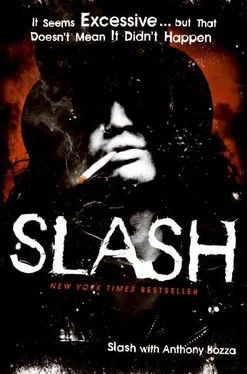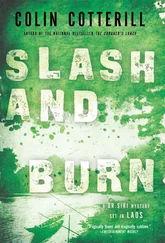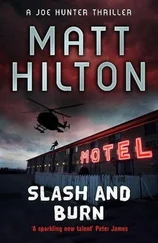When Perla and I started seriously seeing each other, she introduced me to her mom, who is a colorful individual from Cuba. She came to the States the old-fashioned way, on a boat after Castro came to power. I liked her immediately, a sweet but tough lady who, like her daughter, is a very streetwise and observant soul. She liked me from the beginning, mostly because her daughter liked me—she is one of those people whose trust you have to earn. I met Perla’s father a couple years later in Miami. He was in his early seventies, a tall, gaunt fellow who didn’t speak much English. We hit it off right away. He was sort of like a tough Cuban cowboy with a checkered past. Perla and I took him to Disney World the day I met him. The morning before we went to the park, at about 8 a.m., he popped us a couple cold Heinekens from the fridge. He and I sat in comfortable silence watching TV together, since neither one of us spoke the other’s language, until we had to leave for the park. We shared a camaraderie and a silent understanding of each other from that moment on. Unfortunately, he died a year or so later of heart disease. I wish I had been able to have spent more time with him.
She also introduced me to a lot of people with whom I’d become very close friends with, Charlie Sheen and Robert Evans among them, plus a whole slew of other people who may not be as high-profile but are just as cool. We spent most nights going out, socializing, and I was jamming in clubs at least three or four nights a week. I was finally starting to feel a renewed sense of musical inspiration.
I set about putting together a new band; I wanted to do something like Snakepit, but different. Teddy Zig Zag started getting me out on Tuesday nights to jam down at the Baked Potato in Hollywood. I sat in with a lot of blues players and did a lot of classic songs, some of which I’d never played before and I loved every bit of it. Then I got this call from a promoter to do this show, all expenses paid, in Budapest, headlining the jazz festival there. I agreed immediately; it was the kick in the ass that I needed to go out and form a band. I got Johnny Griparic, Alvino Bennett, and Bobby Schneck on rhythm guitar. We put together a cover set that included everything from B.B. King to Steppenwolf to Otis Redding to a few other R&B and blues standards. Then we went off to Budapest to headline and it was great. After that, the calls rolled in for us to do more gigs, and before we knew it, we became a touring band, doing whatever gig we were offered as much for the money as for the beer. We became the most extreme gigs-for-beer touring band I’d ever seen and we had a great time doing it. We’d travel with a huge entourage and generally take over wherever it was that we showed up. I was having a really good time playing in clubs with a great bunch of guys who were just in it for the music.
When our tour was done, I approached Johnny Griparic about forming a new version of Snakepit. We put the word out on the street that we were looking for a new singer. At one point I had some guy get in touch with me who said that he was the singer for Jellyfish. Since I’d worked with Eric Dover on the last record, I decided to meet him. What a strange trip that turned out to be.
This guy met me over at Perla’s house, and the moment I laid eyes on him I had my doubts. He didn’t look the part; he had no rock-and-roll fashion sense at all—he looked more like a construction worker. I invited him in and we sat down in the living room and I pulled out a guitar. Perla was in the bedroom upstairs while this guy started telling me about some song he wrote about this girl. I asked him to sing it while I played the music, and found that the guy couldn’t sing particularly well, so I was suspicious of his being in a band that did perfect five-part harmonies. And the lyrics were pretty naff as well. So I tried to be polite and saw him to the door.
After the guy left, Perla told me that everything he claimed to be and said was bullshit—and she knew the girl he was singing about. I was skeptical; I thought she was jumping to conclusions or being paranoid. I wasn’t all that interested in working with him but I had him over once again just to see if Perla was right. She confronted the guy and every single thing she said turned out to be true. It was at that moment that I realized that Perla was a lot more astute than I gave her credit for. And, as much as I’d hate to admit it, this was one of many times that she saved me from potential disaster. In any case, the guy was a fraud and had lied to me, so I did the appropriate thing: me and Ronnie went to the guy’s houseboat and scared the shit out of him. Ronnie threatened to put a hole in the boat with the guy’s head, and told him to never call or contact me again.
Before, I alluded to how Ronnie became the Single White Female in my life; well, it was right about now when that happened. Over time, Ronnie became my shadow, and he seemed almost possessive of me. He did a great job helping move shit into my new house, and he was always loyal, but when Perla and I started hanging out together, it was as if he were listening in on our conversations. The last straw came when I discovered that he’d spun out in my car and totaled it without telling me. I realized that in a weird way he was both living vicariously through me and wanted to be me in a way. It all came to a head, and thankfully, he left quietly. I’ve since discovered that all the stuff I ever gave him—the gold records, awards, all that shit—he has sold on eBay. Nice.
Anyway, I continued my quest for a singer. When Johnny played me a tape of Rod Jackson, I knew we’d found him. I’d made demos of three or four songs for these different guys to audition with, and Rod did amazing vocals on a demo track called “All Things Considered.” His voice was incredible. It was rock and roll, but it was more like acid R&B delivered at high velocity. So I said, “Let’s meet this guy.” Rod was a perfect misfit: he was tall, half black and half white, always wore shades, and he had dreads. Being from Virginia, he also had a real southern attitude and accent. And when he sings, he can belt out soul like Otis Redding or hit a higher range like Sly Stone, but he also has a softer blues voice like Teddy Pendergrass or Marvin Gaye. It was a different kind of voice than any I’d ever worked with before, but I had nothing to lose, so I went with my heart on that.
We wrote a bunch of bitchin’ stuff over at Mates—Johnny G., Matt Laug, Regan Roxies—everyone together, then I moved the band into my house in Beverly Hills and we rehearsed and recorded in my brand-new studio. We worked hard and we played hard and we’d written an album’s worth of material in no time.
DURING THIS PERIOD I KEPT A CLOSE relationship with Tom Maher, who was the guy who’d been most on my side over at BFD management. When I left Guns, he led me to believe that he’d stopped working over there and would manage me, but I’m not so sure that was really the case. It is possible that he was a mole, letting Doug know my every move. But at this point he was acting as my manager.
At the time, in 1998, the music industry underwent a major change. Black Friday happened, the day that hundreds of music executives were fired; they literally walked down Sunset with their boxes of stuff. Most of the labels were consolidated, one of them being Geffen, which was folded into Interscope. It was the beginning of the end of the music business as I’d known it.
Once Geffen was restructured, I had to make the acquaintance of a handful of people I’d never worked with. I was working on a band that had nothing to do with the grunge sound or whatever you want to call what it was that happened in the mid-nineties: it was a very cool but short-lived moment. And it had been replaced by rap-rock limp crap and boy bands… and Interscope was more or less all gangsta rap. I had no interest in any of that, so I was completely unaware about the shifts within the business.
Читать дальше
Конец ознакомительного отрывка
Купить книгу




![Сол Слэш Хадсон - Slash. Демоны рок-н-ролла в моей голове [litres]](/books/387912/sol-slesh-hadson-slash-demony-rok-n-thumb.webp)


